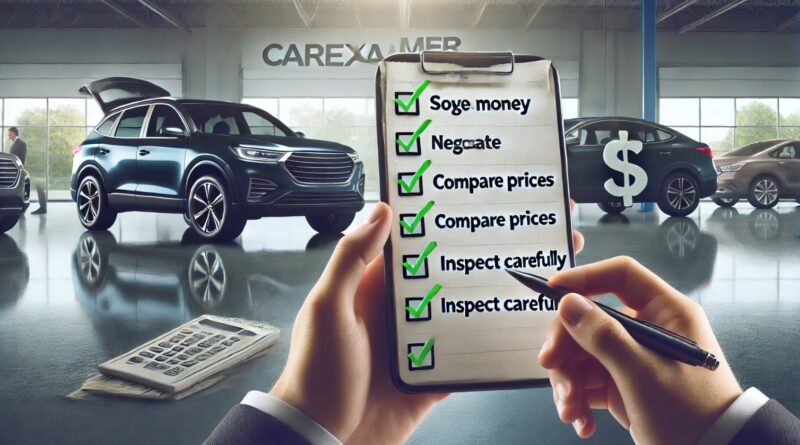6 Smart Ways to Save Money When Buying a Used Car
Here are six tried-and-true tips to help you save money and feel confident about how to save money when buying a used car. Buying a used car is a great way to get on the road without breaking the bank, but it still pays to be savvy about the whole process. From setting a budget to negotiating a fair price.
1. Set a Realistic Budget and Stick to It
The first step to saving money on a used car is knowing exactly what you’re willing to spend. Having a clear budget keeps you focused on options within your price range and helps you avoid overspending on features you may not need. And remember, it’s not just about the car price—consider things like taxes, insurance, registration, and any initial repairs you might need.
How to Get Started:
- Decide on an overall budget, including the extras like insurance and tax.
- Leave a bit of wiggle room for any surprise costs after you buy.
- Avoid the temptation to stretch your budget for features that aren’t essential.
2. Choose a Car with Low Running Costs
Not all cars are created equal when it comes to ongoing expenses. Some cars are easier on fuel, maintenance, and insurance costs, which can make a big difference over time. When doing your research, focus on models that have a reputation for reliability and fuel efficiency.
How to Make a Smart Choice:
- Look up reliable brands and models known for durability, like Toyota, Honda, Mazda, Suzuki.
- Compare insurance rates for different models before you buy—some are much cheaper to insure.
- Go for a fuel-efficient model to keep petrol costs low, especially if you drive a lot.
3. Consider Buying from a Private Seller or Smaller Dealership
While big dealerships often come with more options, you may get a better deal from private sellers or smaller, independent dealerships. Private sellers usually list their cars for less, and smaller dealerships may be more flexible on price.
How to Buy Confidently:
- If buying from a private seller, ask for a car history report to make sure there are no hidden issues.
- Get as much information as possible on the car’s history and why it’s being sold.
- Be mindful that private sales may come with fewer protections than buying from a dealership, so do your homework.
4. Look for Older Models with Low Mileage
Sometimes, older cars with lower mileage offer the best value. Cars that are around 3 to 5 years old often come with a lower price tag, and if they’ve been well cared for, they can be as reliable as newer models. Older cars also avoid that sharp depreciation hit that newer cars experience.
Tips for Choosing an Older Model:
- Aim for cars that are a few years old but haven’t been driven too much.
- Check for a full-service history to ensure the car has been looked after.
- Avoid models that have been discontinued, as replacement parts can be hard to find and more expensive.
5. Be Ready to Negotiate
Don’t be shy about negotiating—there’s often room to bring the price down on a used car. Start by researching the car’s fair market value, so you know what’s reasonable for its make, model, and condition. Then use that knowledge to negotiate confidently with the seller.
How to Make Your Case:
- Use any minor issues, like scuffed paint or worn tires, to help lower the price.
- Stay friendly but firm with your offer, and don’t hesitate to walk away if it’s not a good deal.
- At dealerships, ask if there are any incentives or deals that might help bring down the cost.
6. Look for Warranties or Used approved Options
If you’re looking for added peace of mind, consider buying a car that comes with a warranty or a Used approved vehicle. Cars are usually inspected thoroughly and come with a warranty, which could save you money on repairs down the road. While used approved cars may cost a bit more upfront, it can be worth it if you plan to keep the car for a while.
What to Ask About:
- Check if the car has any remaining manufacturer or dealership warranty coverage.
- Look into Used approved options from trusted brands with good warranty packages.
- Be careful with third-party warranties; they can come with high fees and limited coverage—always read the fine print.
Final Thoughts
Buying a used car on a budget is all about planning, researching, and being smart with your choices. By setting a clear budget, picking a car with low running costs, negotiating well, and considering warranties, you’ll be well on your way to a great deal. With these tips, you can feel confident you’re making a solid investment without overspending on your next used car.
Buying a used VW. Buying used vauxhall, BMW, Jaguar, Ford, Volvo, Range rover, Bentley, Aston Martin, Porsche, Ferrari, Lamborghini, Maserati, Hyundai, Tesla, Honda, Pagani

